With winter coming we find ourselves indoors, and experiencing increased stressors related to the holiday season. Less sunlight in our days can contribute to some seasonal mood fluctuations and some of us may be traveling, hosting, or somewhere in between amidst social engagements. Stress is a valid emotional response to life’s problems, and it is okay, you may be experiencing it. Causes of stress like experiencing financial, physical, or emotional burdens with last minute deadlines for 2025 or planning can accumulate. So what do you do to combat this?
Is Stress Effecting Your Breathing?
Common sense would tell us that stress isn’t beneficial to our long-term health. Stress hormones like cortisol have a purpose in day-to-day to stimulate our “Fight-or-Flight” responses. However, sustained high levels of stress can lead to long term adverse health risks. My first bit of advice would be to take a moment for personal wellness when you are stressed. Take a moment to breathe or walk! Focus in and ask yourself, is my breathing shallow? Is my breathing deep from the diaphragm?
Your energy and responses to life are largely impacted on your breathing pattern. In yoga this is referred to as the “prana”, or first unit. Deep breathing patterns help regulate the parasympathetic (“Rest and Recover”) responses in our body.
You might explore box breathing. Box / Corner breathing consists of:
“4-4-4-4” Count Breathing while envisioning an equal sided box.
- Breathing in as you go up on side of the box for 4 counts
- Holding at the top of the box for 4 counts
- Breathing Out going down the side of the box for 4 counts
- Holding Empty Breath for 4 Counts
Setting a Plan that Prioritizes Wellbeing
After some time to reset and breathe (3-5+ Minutes), feel free to take some time to self-inventory your life and write out a two-column list. Honesty is key!
This list could include everything that is a challenge on one side. The other side could include a list of various supports you have available. Supports can include resources, relationships, community, tools, etc. Supports may be something small like utilizing the recovery area at NIFS for ten minutes.
Now that you have a list of the Challenges and Resources, sit with this for a moment.
Plan how you might utilize existing support systems the next time you are challenged. For example, if budgeting is a challenge, you can lean into a friend who knows finances. Recognizing that we have an inherent need of relatedness, and integrating support systems into our day-to-day challenges removes a lot of the pressures of individualized performance and may lead to better outcomes by involving more perspective and outside assistance.
Challenges in your life may or may not be solvable right now, and that is okay. What you do have control over is your small habits. You might think about a SMART goal related to sleep, hydrating, recovery, and mental wellbeing. Your goals should be meaningful to you and offer a measurable timeline you’d like to achieve things. Keeping your goal realistic to your current responsibilities and capability. Planning actionable weekly steps, you can track can be a start when setting 3-Month Goals.
Fortify and Plan for Setbacks
As you integrate wellness habits into your life, remember that setbacks will always be unavoidable. Life is simply unpredictable. The best approach to bouncing back from setbacks is proactive planning.
As a Health Coach (NBC-HWC), I’ve been fortunate enough to be part of the process of goal setting and action planning with many clients. When people are actively making changes to behavior, there is a phenomenon where people start to fall off with new routines around 3 weeks in. As part of the coaching process, we gameplan that setbacks will happen. You can do this for yourself right now!
After writing your goal out, then write out everything you can think of that could go wrong. Think about your job demands, family needs, school exams, car troubles, financial struggles that may be upcoming. Try to write out at least one specific plan to respond to each setback.

When life gets busy and overwhelming, remember your action steps and goals. You know your strengths, you know your challenges, and you know the steps to get back on top. You got this! NIFS has many coaching staff available, if you ever need assistance in setting your own wellness goals. You could start by taking advantage of a free complimentary meeting with a trainer included with your membership!

 The Holiday Season is here, and we’re anticipating time to appreciate the important things in life, such as time with family and friends. However, some of us may experience stress during this time of celebration. Stress can affect each of us in multiple ways.
The Holiday Season is here, and we’re anticipating time to appreciate the important things in life, such as time with family and friends. However, some of us may experience stress during this time of celebration. Stress can affect each of us in multiple ways.
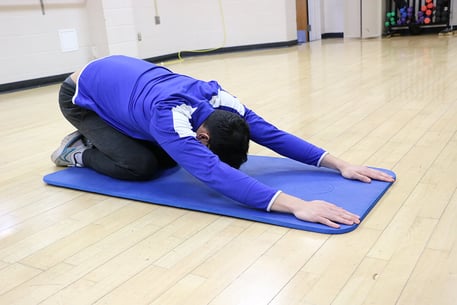
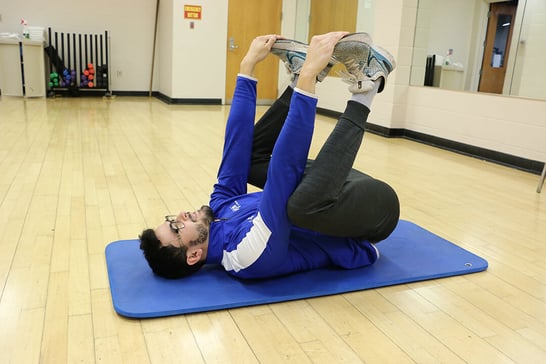
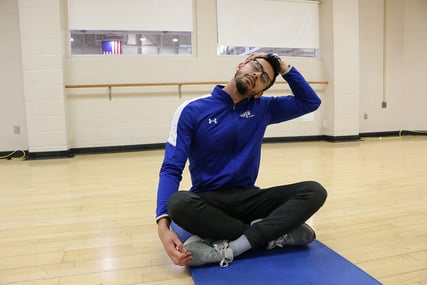
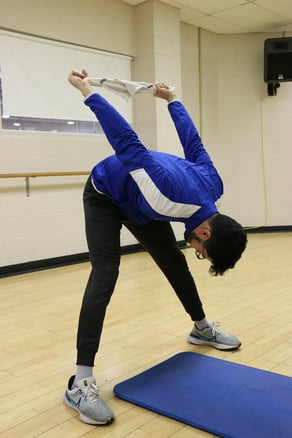

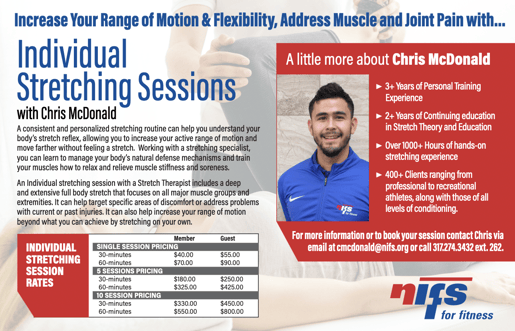
 In
In 
 In today’s busy world, it’s easy to put self-care on the back burner. When there are seemingly endless deadlines at work that must be met, household chores to tackle, and a calendar that is jam-packed it can be extremely difficult to even think about taking time out for ourselves. This is why we must take just a few minutes out of our days. And, as Millennial as it may sound, we need to begin to give some love to ourselves so that we not only exist, but live life to the fullest.
In today’s busy world, it’s easy to put self-care on the back burner. When there are seemingly endless deadlines at work that must be met, household chores to tackle, and a calendar that is jam-packed it can be extremely difficult to even think about taking time out for ourselves. This is why we must take just a few minutes out of our days. And, as Millennial as it may sound, we need to begin to give some love to ourselves so that we not only exist, but live life to the fullest.
 Seriously. Stop and take a breath. Don’t judge your technique, just breathe in and out. Failure to do both in and out will likely result in you fainting, and the ERs and urgent care centers have enough to do without you coming in with a cut forehead requiring stitches.
Seriously. Stop and take a breath. Don’t judge your technique, just breathe in and out. Failure to do both in and out will likely result in you fainting, and the ERs and urgent care centers have enough to do without you coming in with a cut forehead requiring stitches. In The Wizard of Oz, Dorothy woke up after a terrible storm in a world she didn’t recognize. The normal that she had known no longer existed. We are “not in Kansas” (or Indiana, for that matter) anymore after COVID-19 erupted around the world. Normal is gone for the time being. Some people have lost jobs and incomes, or are forced to work from home. Some have had or are fighting the disease, and some unfortunately have lost their lives.
In The Wizard of Oz, Dorothy woke up after a terrible storm in a world she didn’t recognize. The normal that she had known no longer existed. We are “not in Kansas” (or Indiana, for that matter) anymore after COVID-19 erupted around the world. Normal is gone for the time being. Some people have lost jobs and incomes, or are forced to work from home. Some have had or are fighting the disease, and some unfortunately have lost their lives.  Growing up and continuing to live in the Midwest, I’ve grown to appreciate the summer months more and more. In fact, in Michigan we joke that there are really only two seasons:
Growing up and continuing to live in the Midwest, I’ve grown to appreciate the summer months more and more. In fact, in Michigan we joke that there are really only two seasons: Throughout your life, you will come across times and situations that are tough, making you feel as though getting through it all is inconceivable and hopeless. There are more traditional ways to deal with these ups and downs of life, such as therapy, but there are other ways to overcome stress in life that can be as easy as taking a walk, shooting some basketball, or even lifting weights.
Throughout your life, you will come across times and situations that are tough, making you feel as though getting through it all is inconceivable and hopeless. There are more traditional ways to deal with these ups and downs of life, such as therapy, but there are other ways to overcome stress in life that can be as easy as taking a walk, shooting some basketball, or even lifting weights. Yoga is pretty popular, and not just in the fitness industry. It’s getting lots of press for its ability to aid in living a generally healthy lifestyle. When people hear about healthy living, they often associate that only with exercise, and sometimes neglect the importance of a balanced diet and de-stressing techniques. Studies are now showing that it’s important to balance out all areas of life; not just one part should have dominance.
Yoga is pretty popular, and not just in the fitness industry. It’s getting lots of press for its ability to aid in living a generally healthy lifestyle. When people hear about healthy living, they often associate that only with exercise, and sometimes neglect the importance of a balanced diet and de-stressing techniques. Studies are now showing that it’s important to balance out all areas of life; not just one part should have dominance.